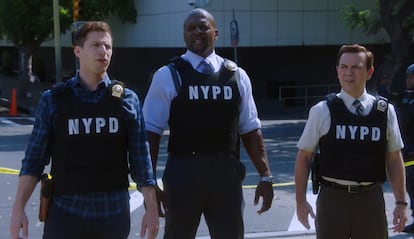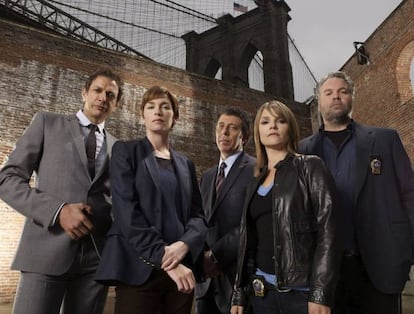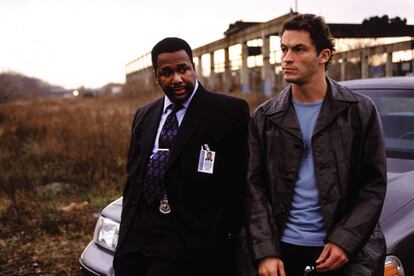When the heroes are racist and authoritarian: Why cop shows have to change
From ‘Starsky and Hutch’ to ‘CSI,’ the relationship between law enforcement and American television has almost always been mutually beneficial. Current events call for a new approach

The formula hardly changes, although the variables do: a duo of police officers, be they a man and a woman, a rookie and a veteran, different races or different nationalities, but always with their own personal dramas. A few other common factors appear: a grumpy but kind-hearted boss, a veteran detective about to retire and an eccentric forensic scientist. The scenery may include the skyscrapers of New York or the neighborhoods of Chicago, although the sun of Miami and the hills of Los Angeles also have their glamour. The end result is almost always the same.
“Most police shows start with a crime that has to be solved and end with the criminals behind bars,” says Aly Thee Activist in an email. The young American lives in Grand Rapids, Michigan, where she uses social media to advocate for the rights of Black people in her country. “This creates a discourse of good versus bad that never questions the system or the origin of crimes, such as poverty.”
The relationship between the men in blue and television made in Hollywood is quite old, but it shows no signs of giving out. A study by The Hollywood Reporter revealed that, in 2020, police films represented one in five television productions in the United States, more than any other genre of fiction on the small screen. As of today, the series NCIS and its three spin-offs make up to 979 episodes. CSI and its four derivatives have produced 828 episodes, while there are 1,316 episodes of the seven series that make up the universe of Law & Order.

But the unjustified killings of Black people such as George Floyd, Breonna Taylor and Eric Garner — among many more cases — by law enforcement officers have generated a more critical look at the United States security forces. Fiction has not escaped the magnifying glass. The term copaganda has become popular to describe a pro-police bias in television shows and movies.
“Copaganda serves to change popular opinion about the police and the entire judicial system,” explains Aly Thee Activist. “An example of this is the overwhelming number of television series that focus on law enforcement officers and their day-to-day life within the security forces. The big problem with these programs is that they do not recognize the deep flaws that exist within police activity.”
The academic David Thorburn points out to us in a telephone conversation that many of those productions exist to affirm the police’s role. “The main function of crime series has been to assure the public that they live in a just and stable society, of law and order, which has become more difficult to justify over the years,” adds Thorburn, a professor of Literature at the Massachusetts Institute of Technology and an expert in television studies.
The academic believes that the narratives that serve as social reaffirmation are as old as Homer’s epics. But he cannot deny that the collective trauma generated by the 2001 attack on the Twin Towers created the need for American viewers to feel safe. “9/11 was a game changer for the way police and law enforcement were portrayed on television,” Thorburn says. “The massification of series about law enforcement officers, such as CSI and all its derivatives, and the disappearance of more ambiguous figures is evidence of this. In a way, we still live in a war on terror.”
All cops are cool
However, the relationship between the police and the small screen is almost as old as television itself. “Dragnet wasn’t the first cop on American television, but he was the most important and influential of his time, creating the model that many would follow later,” says Thorburn. Created by and starring Jack Webb, Dragnet (1951-1957) followed the experiences of a cop who walked the streets of Los Angeles in a raincoat and fedora, a cigarette in his mouth.
Webb worked with the Californian city’s law enforcement agency to bring a supposedly realistic vision to the screen. “Dragnet was supposed to accurately represent police work in an almost documentary style, but it was all very romanticized,” Thorburn says. “It attempted to paint the police as very direct, objective and professional people.” Webb is said to have paid $25 to any officer who brought him a real case that could be used in the series.

Many other shows have shared the goal of faithfully representing police work. Law & Order’s plots famously draw on real cases: the franchise has aired at least three episodes inspired by the pedophilia accusations against Michael Jackson. Also criticized is the “CSI Effect”: it has been argued that the quintet of series about forensic experts generates excessive confidence in the reliability of forensic science.
The LAPD’s assistance to Dragnet wasn’t free. The forces of order provided advice, equipment, locations and real cases to the producers of the series in exchange for having a say in what the public would see. An article in The Washington Post notes that if police script reviewers disapproved of a scene, the entire episode could be cut.
The Los Angeles Police Department needed good publicity. Jack Webb’s series couldn’t have come at a better time: on December 25, 1951, the same year that Dragnet began airing, a group of drunk officers spent an hour and a half beating up seven detainees for assaulting two police officers during an arrest. Five of the seven were of Mexican origin. The Los Angeles Times reports that it was the first time that local law enforcement officers had been prosecuted and convicted of excessive use of force. And it was the first time that the press portrayed the police in a negative light.
Currently, some police forces in the United States maintain a presence behind the camera, although they no longer censor scripts as in the days of Dragnet. The New York Police Department has a Film and Television Unit in charge of providing assistance and advice to audiovisual productions in the Big Apple. As it explains on his website, any series that has actors playing uniformed officers requires the presence of someone from the NYPD Film and Television Unit on set.
Imaginary crimes, real consequences
After Dragnet, TV cops had to attract the new generations. The 1970s saw Starsky and Hutch (1975-1979) and their iconic Ford Gran Torino, while the clothing, style and pastel colors of Miami Vice (1984-1990) are synonymous with the 1980s, “although Miami Vice was much more visually and ideologically complex,” adds the MIT professor.
Thorburn considers that from these years there was a considerable change in the Dragnet formula. “It is really in the eighties when the police begin to be shown as imperfect. Hill Street Blues [1981-1987], the most important and complex detective show produced at the time, questioned police authority and reflected racial tensions in a way that had never been done before.”

Other later television programs that the academic points out as relevant in showing the nuances of police work are NYPD Blue (1993-2005) and The Shield: Outside the Law (2002-2008). The shift, Thorburn argues, was made possible in part by the rise first of cable television in the 1990s and then of streaming platforms in the late 2000s.
“I think The Wire is one of the best television shows ever made,” Thorburn says of the HBO production, which aired between 2002 and 2008. “It wasn’t just a series about the police. It focused on society in general. It paid the same attention to law enforcement officers as it did to criminals, and more than once the criminals turned out to be more moral than the police themselves,” concludes the academic.
Aly Thee Activist is much more critical than the MIT professor. She believes that a good part of police series continue to be, in one way or another, a form of propaganda. “These programs seek to distract viewers from the fact that the police system is deeply corrupt and based on racism and the oppression of the working class,” argues the young activist. “I don’t think showing people of color as police officers or working in the judicial system changes the underlying message.” This is the case of the comedy Brooklyn Nine-Nine (2013-2021), where the officer in charge of the police station is a gay Black man. The series came to an end after the murder of George Floyd, an event that was integrated into the plot of the season (one of the protagonists left the force in protest and began a career as a private detective).
Though the policemen are imaginary, their effect is very real. A 2022 study from the Pew Research Center indicates that violent crime has fallen precipitously in the United States over the past 30 years. Despite this, six in ten people consider violent crime a priority when it comes to voting, particularly for older and more conservative voters.
Viewers of public-access television channels in the United States are also usually made up of mature people. According to The Guardian, FOX has the youngest average viewer age: 56 years old. Variety indicates that seven of the twenty most-watched shows between 2022 and 2023 were crime shows, including two NCIS spin-offs and three from FBI, a new franchise from Dick Wolf, the creator of Law & Order.
“I think that while some of the viewers’ opinions stem from police shows, I also think that some of these viewers already had their ideas about the police already made up,” concludes Aly Thee Activist. “They’re just looking to watch this type of programming to confirm their views.”
Sign up for our weekly newsletter to get more English-language news coverage from EL PAÍS USA Edition
Tu suscripción se está usando en otro dispositivo
¿Quieres añadir otro usuario a tu suscripción?
Si continúas leyendo en este dispositivo, no se podrá leer en el otro.
FlechaTu suscripción se está usando en otro dispositivo y solo puedes acceder a EL PAÍS desde un dispositivo a la vez.
Si quieres compartir tu cuenta, cambia tu suscripción a la modalidad Premium, así podrás añadir otro usuario. Cada uno accederá con su propia cuenta de email, lo que os permitirá personalizar vuestra experiencia en EL PAÍS.
¿Tienes una suscripción de empresa? Accede aquí para contratar más cuentas.
En el caso de no saber quién está usando tu cuenta, te recomendamos cambiar tu contraseña aquí.
Si decides continuar compartiendo tu cuenta, este mensaje se mostrará en tu dispositivo y en el de la otra persona que está usando tu cuenta de forma indefinida, afectando a tu experiencia de lectura. Puedes consultar aquí los términos y condiciones de la suscripción digital.








































